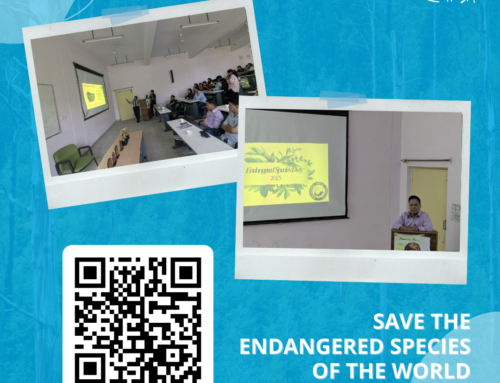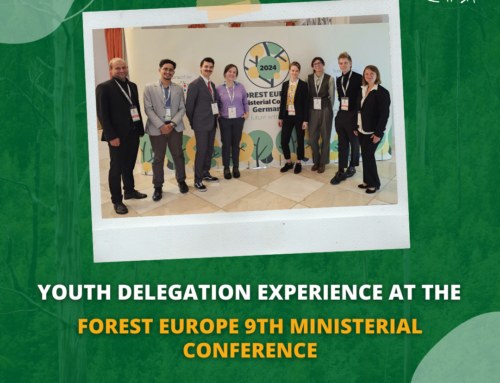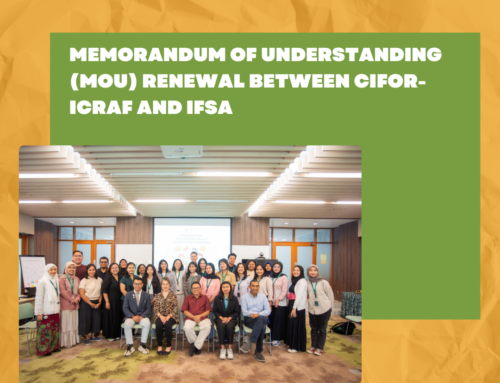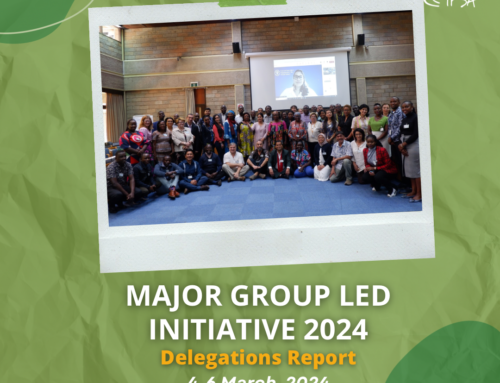
IFSA Interviews
FOREST EUROPE HLPD
Interview 1
Interviewer: Volodymyr Kravets
Interviewee: Fanny-Pomme Langue
 Volodymyr: Today we interviewed Fanny-Pomme Langue. Please let us know from which organization you are and what it does.
Volodymyr: Today we interviewed Fanny-Pomme Langue. Please let us know from which organization you are and what it does.
Fanny-Pomme: Thank you for the opportunity to be interviewed. I am a Secretary General of CEPF (Confederation of European Forest Owners), which represents the voice of European forest owners at the EU level. We are based in Brussels, so we are the bridge between European forest owners and EU institutions, and stakeholders. Our members are national forest owners organizations.
Volodymyr: Thank you so much! Now we understand the focus of your organization and the scale. Let’s move to the second question, what is the contribution of your organization to today’s event, or the resilience topic of forest management?
Fanny-Pomme: First of all, regarding this event in particular, it was very important for us to be here today, because the question of forest resilience is essential for forest owners. Forest owners in the daily management of their forests are facing increasing consequences of climate change. These uncertainties make forest management decisions increasingly complex and challenging, given that the ecological, economic, and societal expectations put on forests for the next years or decades to come are not guaranteed. This is why this discussion today is of high interest. And a note regarding Forest Europe: we believe that it is highly important and very good that Forest Europe is organizing this discussion. We CEPF are observers of Forest Europe and we see it of utmost importance to create this dialogue, because as we heard, climate change consequences are not national issues. Climate change doesn’t know the borders, so it is very important to work all together.
Volodymyr: I agree with you! And I have heard a statement that supports what you just said, that any environmental problem, even if it’s happening on the local scale, can be considered as an international one as it is all interconnected. The last question to ask and it will be interesting for our IFSA participants to know is: What would be the most important action to take right now in the European Union to achieve the focus of your organization, that you mentioned before?
Fanny-Pomme: As we are a European organization based in Brussels, our role is to convey the messages of the forest owners to those who are defining the policies and the legislations at the EU level. Forest owners should be considered partners when forest-related policies are defined. Forest owners are the ones who will implement these policies, so their expertise must be recognized and their work must be supported via, for example, advisory services or financial support, engage with them. Another very important message is that one-size-fits-all policies at the EU or Pan-European level cannot work. Today, there are around 15 million forest owners in the EU, and there are as many forests as forest owners. These differences are a strength as they make it possible to fulfill the varying needs of society. Management decisions to improve forest resilience must therefore be tailor-made and locally suited to our forests. They also need know-how and good practices exchange. If you would be interested in knowing more about forest owners’ messages, you can read the European Forest Owners Manifesto that was prepared to gather these messages towards EU policymakers ahead of the 2024 EU elections.
Volodymyr: Thank you very much! It was a pleasure to have you here!
Interview 2
Interviewer: Ole Gramann
Interviewee: Jose Bolanos

Ole: Hello everyone! We are here on the second day of the HLPD, and we are on an excursion to the Grunewald forest. And I have the pleasure of having an interview with Jose Bolanos. I would like to ask you a few questions regarding our topic, of resilient forests with Forest Europe, so my first question would be – what are the key elements for IUFRO contributing to more resilient forests in the future?
Jose: Thank you! First of all, IUFRO is the International Union of Forest-Research Organizations, which means that we are connecting people who do forest science. So starting from that, how we contribute to more resilient forests in the future, it has to do with people and their work, and people that work on forest science of course. Another key element is an alignment with UN SDGs. Mainly goals number 13 and 15, “Life on land” and “Climate action”. And because we do have a lot of diversity, as a global organization, that means that we have a diverse input of information, diverse input of research, and different forest landscapes. By sharing this information I think it is a key to understanding how we can target a more resilient future. Something else that we do a lot, is communication, and outreach that we do, we bring it to the interested stakeholders and also to the international platforms where these topics are discussed, we bring the findings of research to the people, so decisions can be based on science, on findings that we do as a research community.
Ole: Thank you for the qualitative answer! For me as an IFSA representative, and also a representative of the youth at this event, it is interesting, how IUFRO is supporting possibilities of contributing to stronger youth involvement in decision-making?
Jose: For me, this is one of the questions that should be asked to everybody at this event! This is very important, and this is more on a personal note, I believe that the youth should be already involved in every process. So we do have a strong partnership with IFSA and thought that there are different things that we do. For instance, you are participating in this meeting, but we are also encouraging IFSA to participate in all the meetings that we conduct. In addition to this, the IFSA President is always invited to the IUFRO Board meeting, and this person always has the possibility to join. For example, Agustin was in India last year to attend the Board meeting, and for the next meeting, we also have the presence of Isabelle. So this is really important for us, and also we offer an internship, so somebody can join. Thus we had Sandesh who just left the IUFRO HQ, he was there for two months for the internship. This gives the opportunity to see what we do at IUFRO, at least at the secretariat. Another thing, in that case, IFSA was also invited to be a part of the Congress Scientific Committee, so these are the people who prepare the scientific part of the Congress, which will be happening in the summer of next year. This gives the opportunity to provide input during the sessions with the scientific committee. Of course, I wish that there were more options, but I am happy to see that we are at least doing something.
Ole: Thank you! And also the possibility that we have the opportunity for the internship and really are involved and included in the process is really nice. Very much appreciated from our side to have that long-year collaboration with IUFRO! My final question will be a more general one – how can international organizations, like IUFRO, support the exchange of knowledge and the best practices among European nations and support sustainable forest management, and today’s topic of increasing the resilience of forests?
Jose: This is always the topic with us, as we are a research network, which means that we have to share the information, the knowledge, and the findings. Within IUFRO we organize a lot of meetings, and this can be more specific on topics, or more general, we also organize a lot of webinars, with free participation. There are also two specific programs, the one is Scientific Assistance Program, its main objective is to raise the skills, development of capacities. They target economically disadvantaged countries, and people, foresters who come from these countries, and offer them the possibilities through grants, through interning in different places, for instance there was a person from Argentina, then she moved to Germany for some time, where she was able to conduct some research, and bring it back to Argentina. So these kinds of processes are very good, and they also help people to participate in Congresses and international meetings. And then there is also a Science-Policy Program, it is linked to the Collaborative Partnership on Forests. And what they do is that they have these global assessment reports, where they collect all available information. For instance, the latest one was on forests and human health. And with the forests and human health report, where they collected all the relevant information, and brought it to the attention of the different international processes. They are participating in COPs, and going to the UNFF, with this information to bring it for better decision-making.
Ole: Yeah, that gives the brief vision of the IUFRO work, I think all my questions are answered, and thank you so much for the contribution!
Interview 3
Interviewer: Anne Austen
Interviewee: Jo O’Hara
 Anne: What were your expectations on this event today?
Anne: What were your expectations on this event today?
Jo: Okay so to be honest, I didn’t know for sure because it’s such an enormous topic, with so many nationalities represented, looking at practitioners and policy, with everything in between. It’s a very ambitious discussion I think! So my expectations were that it was going to be quite hard to pull all of that together. But I’m always up for a challenge. I was very interested to understand how this question of resilience is playing out in different countries, and also contrasting what the policymakers are seeing with what the practitioners see. And I think we got that.
Anne: Yeah. So what would you say are the main two bullet points out of the discussions today?
Jo: I think, that resilience is happening now. It’s no longer: “Oh, we’ve got the time to think about what’s going to happen in the future”. We need to be doing and taking this time to increase forest resilience. In order to do that, we have to integrate considerations of the people, the science, and the practice. Secondly, the policy, law, and society level can and should enable this across the different sectors. So that’s what we have to learn from the different countries, we are all trying different things in different situations.
Anne: Yeah. So since we are from the younger generation, we are especially interested in the educational points. I think in the second panel, there was the beginning of the discussion on the topic of education.
Jo: We could have a whole panel on this whole panel on forestry skills.
Anne: And of the society’s acceptance of the management of forests.
Jo: Absolutely.
Anne: But as the status quo of forestry education is now: do you think it will serve as a backbone for the resilience of forests and all the topics we are handling? Or do you think there is room for more development in the forestry education?
Jo: I think in every country this is a challenge, however, I don’t know about the German education system, I’m more familiar with the UK and Ireland. One concern I have is a separation between the education of the next generation of foresters and the people who are in the thick of it now.
So I worry it’s too theoretical. Also, the people who are teaching: It’s a long time since they’ve been practicing forestry, so they may be basing their teaching on what was absolutely good practice 15 years ago but isn’t necessarily what we’re thinking and doing now. That’s not an insult to our amazing teachers, but it’s a risk if teaching gets out of step with what young foresters find as reality when they start work.
The other concern I have is that we’re not getting enough young people into forestry. What we’re seeing is a decline in young people recognizing the bioeconomy and forestry economy. There is a big increase in interest in the environment, climate change, ecology, yeah. But our university applications are reducing for forestry. Forestry courses are closing down, and we’re not getting that generation. That worries me.
Anne: Which I think also links back to the acceptance in the Society of Sustainable Forest Management and how we talk about it. You have to talk about what we do, and we have to be more transparent.
Jo: And we have to talk about that wood is sustainable. Wood is an ecological material. But there’s a growing narrative that we shouldn’t be building with wood. But instead, we’re using plastic and steel and concrete?! That is very real. That discussion is a real problem in achieving a sustainable future.
Anne: And if we are not the ones who are talking about this, other guys will do it. But maybe not in our sense. So yeah, it’s quite important.
Jo: Absolutely!




